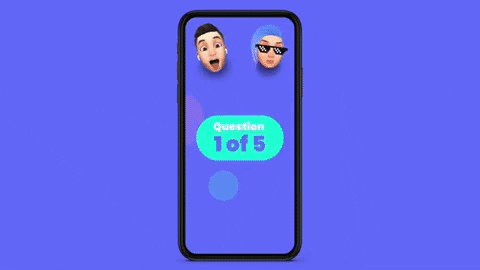

Thor Fridriksson is no stranger to trivia. The tech entrepreneur founded QuizUp, one of the hottest mobile games of the early aughts, which attracted more than 100 million downloads, a deal with NBC, and had raised more than $40 million from notable investors. Plain Vanilla Games, the parent company of QuizUp, eventually sold to GluMobile for $7.5 million.
But that doesn’t mean Fridriksson is hanging up his hat on trivia. In fact, the lessons he learned the first time around have led him to this very moment. Today, Fridriksson is launching Trivia Royale, the latest game out of Iceland-based TeaTime Games.
Trivia Royale is, like it sounds, a trivia game in the genre of Battle Royale. It’s a 1,000-person head-to-head Trivia tournament. Like QuizUp, players can choose to do one-to-one Trivia matches based on categories in a casual way. But the real draw of the mobile game is Trivia Royale.
It starts with 1,000 people who are matched into one-on-one battles around general trivia. Each battle includes five questions, that go from easy to more difficult, with 10 seconds to answer each question. The faster you answer the question, the more points you get. The final question in the battle is worth double points.
If you lose your battle, you’re out of the tournament. The pool then drops to 500 people, and then to 250 people, and so on and so forth until you’re down to the final four and the final two. Folks who win a Trivia Royale get a ‘crown’ that’s displayed on their avatar, as well as access to the Royale Lounge, where they can check out global and local leaderboards and chat with other Royales.
What’s most interesting about Trivia Royale is that it’s built on the TeaTime Live platform.
TeaTime, cofounded by Fridriksson, launched in February of 2009. The platform is not a game in and of itself, but rather a developer platform for game makers that adds a new level of engagement, interaction and monetization to mobile games.
On TeaTime, users can create an Animoji-style avatar that employs the front-facing camera of a smartphone to let players interact in real time with facial expressions as they play a game. Since most users don’t necessarily want to show their actual face to strangers during gameplay, TeaTime uses Snap-style filters and Apple Animoji-esque avatars to let users engage with one another without revealing their actual identity.
The initial failure of QuizUp was an inability to monetize. TeaTime was built to avoid making that same mistake twice. The existence of avatars offers a built-in monetization strategy as users look to customize and build out their avatars.
Fridriksson was also extremely averse to mobile advertising within games while he was running QuizUp, and has made his peace with some advertising with the launch of Trivia Royale. When a user wins and is rewarded with points, the user can double those points by watching an ad.
Users can also supplement their winnings by buying virtual currency to update their avatar with hats, piercings, hand gestures, glasses and more.
Moreover, users need a ticket to enter into a Trivia Royale tournament. These tickets are provided every couple hours, so users who want to play game after game without waiting will need to use virtual currency to buy a ticket.
Obviously, it would be difficult to get and keep 1,000 players in a single tournament at once, so Trivia Royale focuses on matching people who are at the same level in the tournament rather than holding these tourneys in individual lobbies.
“The challenge is to get a hit game on a platform before it becomes a platform because you need that,” said Fridriksson. “So what I did, essentially, is that I just totally changed my focus as a CEO and went into full-hearted product mode for this game. I find myself back in the mode of creating a cool user experience, and it’s the most fun I’ve ever had.”
In beta, the company has used bots to fill in the gaps where there aren’t available matches for players. In the first five rounds of the Trivia Royale tournament, Fridriksson says there is about a 60 percent chance that users will be matched with a real person, with the likelihood of being paired with a bot getting higher then further a user gets in the tournament.
The company ran a beta in Ireland, New Zealand and Canada over the past two weeks and has gotten 9,000 beta users, with day-one retention at 50 percent and with average users playing around 12 games per day.
As the game gets more users, the company hopes to match users with real people 95 percent of the time and ultimately get to a place where the bots fade out of the equation.
At this point, the game has more than 20,000 questions across 40 categories including TikTok, Geography, Movies, Superheroes, Videogames, Sports, Disney, and Logos, with more questions added every day.

